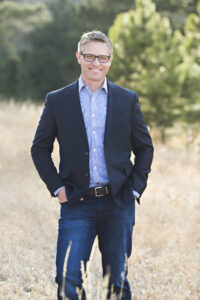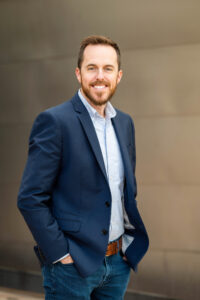Editor’s note: I recently spoke with Jeff Hoffmeyer about his new role at Denver Institute, his background as a pastor, his excitement about fundraising, and root canals. Our conversation below has been lightly edited for length and clarity.
DM: You’ve held a variety of roles during your career; tell me more about your work prior to starting this position with DIFW?

JH: I graduated from seminary in 2005, and my first call was as an associate pastor in Sacramento, California. I was leading small groups and men’s ministry for almost four years, and it was a really great start for me. I was the young associate pastor who could “do no wrong,” and I came out of that role with a solid understanding of who I was as a pastor and as a leader. At that point, my family moved back to Boulder, which is where I'd grown up and where I’d met my wife, Heather, at the University of Colorado. She started a medical practice in Boulder and I served in a few interim pastoral jobs. In between those opportunities, I finished a Ph.D. in theology, which I had started when we were in Sacramento. Four years ago, our family moved to Los Angeles for me to serve as senior pastor at La Cañada Presbyterian Church; we were there for just over three and a half years. When that call ended, our family moved back to Boulder and I eventually connected with Denver Institute.
DM: It seems like an unusual transition to move from pastoral roles to fundraising for a faith-based nonprofit. What are the similarities in this role that line up with your pastoral background?
JH: I've been a pastor for 15 years; this new role is a switch, but I don't see it as a vocational jump. My role with Denver Institute will continue to be pastoral, particularly as I meet faithful Christians in various industries. A lot of the joy of the job is getting to know these faithful Christians doing amazing things for God's kingdom. I see that as a pastoral role, particularly the act of listening well to those I'm going to be interacting with, so I see a continuation there. Advancement or development was an area of ministry as a pastor that I needed to do; churches need to raise funds and the church I served in previously embarked on a capital campaign while I was there, so fundraising was a necessary part of my job. It was just surprising how much I liked that part of the job.
DM: Tell me more about that. I haven’t heard many pastors enjoy that aspect of their work.
JH: Most pastors kind of think about fundraising like most people think about root canals: “you’ve got to do it, but this is going to hurt,” but I didn't have that experience. Mostly because it's like what you and I are doing right now: sitting down and talking and listening to each other. That's what I got to do with people in the church. Eventually, when you begin asking people for money, which is the part that people usually don't like, it’s exciting because it’s…a discipleship moment. As a pastor, I love that; I think that's why there's so much in the Bible about giving, even though it makes a lot of Christians uncomfortable. If we took out all those passages of the New Testament that are about money, there'd be big chunks removed; but giving is about discipleship. So even asking people for money was something that I came to enjoy because it's opening up kingdom doors.
DM: How did you hear about this opportunity?
JH: I was talking with a friend of mine and a friend of Denver Institute, Mark Roberts at the De Pree Center at Fuller Theological Seminary about the possibility of development jobs. The next day he received an email from DIFW about the job opening; he sent it to me and I felt like my heart leapt within me when I read it, to use a cheesy biblical phrase. My heart started beating faster and I immediately thought “This is it!” I had long respected Denver Institute and had met with Jeff Haanen about five years ago. Denver Institute had been on my radar, and I knew the organization was doing great work in the area of faith and work. I knew I connected with the place's mission, so I quickly submitted my resume. I have a strong degree of excitement and enthusiasm about being a part of this team.
DM: What excites you most about Denver Institute and your role with fundraising?
JH: Part of what I want to do is understand the distinctive elements around a culture of giving at Denver Institute. What would it look like for us to build intention around a culture of sacrificial giving? Ultimately we're calling donors to sacrificial giving, but that has to be inspired and spurred on by those of us who are working in fundraising for Denver Institute. What does it mean for me to be sacrificial with donors? One example is generous listening: when I'm sitting down with someone, I can give them the generous gift of being fully attentive to them in that moment. That’s one of the things I'm excited about and one of the things that was hard to do as a pastor because I had so many other things on my mind – I was thinking about my sermon or about the board meeting that night. To be able to listen generously to those that I'm with is sacrificial, and hopefully that spurs on some sacrificial generosity from them.
Learn more about Jeff at https://www.jeffhoffmeyer.com/.

